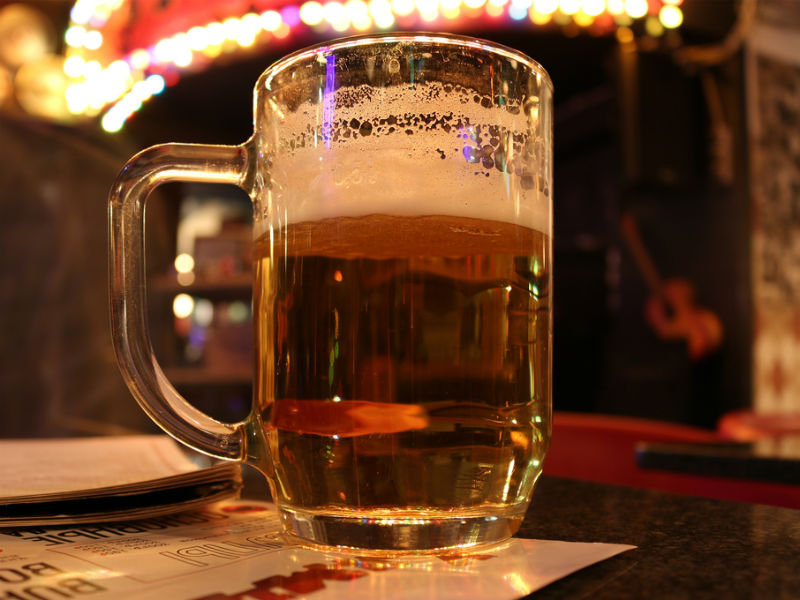In Wisconsin, teenagers can join the military at the age of 18, have sex at 18, drive a car at 16 and hunt at 12. But they can’t have a beer until they are 21 years old.
A few Republican state representatives want to change that law and lower the legal drinking age to 19, according to the Associated Press, which reported a bill was circulated Wednesday. But, said the AP, there are two major obstacles to the idea, which was sponsored by Reps. Adam Jarchow (R-Balsam Lake), Cindi Duchow (R-Delafield) and Rob Swearingen (R-Rhinelander), a former president of the Tavern League of Wisconsin and owner of the Al-Gen Dinner Club.
The proposal faces an uphill battle not only because it is opposed by powerful Republican Assembly Speaker Robin Vos – essentially the arbiter of which bills get called for a vote – but also due to current federal law that says any state with a drinking age under 21 can lose 8 percent of its federal highway funding. In Wisconsin, per the AP, that would mean a $53.7 million loss. Thus, the federal government would have to agree not to withhold highway money before the state could enact the new bill.
But disregarding those significant potential hang-ups – and presuming the idea is born of more political thoughtfulness than just the business benefits of its architects or lobbyists – it’s an interesting proposition. All 50 states have set their minimum drinking age at 21, though there are some exceptions and variants related to drinking at home, with adults/parents present, etc.
Proponents of lowering the legal age often argue that having it at 21 has not stopped teen drinking, and allowing 18- to 20-year-olds to legally consume alcohol would reduce unsafe, unsupervised binge drinking, according to ProCon.org. Another common, more basic argument is that a person is legally an adult at age 18, and adults should have the right to make decisions about their own alcohol use.
On the other side, opponents contend that lowering the drinking age would be a danger to personal health, as young adults are still developing mentally and emotionally, as well as a threat to public communities and drivers on the road. Studies have found higher drinking ages associated with lower rates of traffic accidents, and the Highway Traffic Safety Administration estimated that having the minimum legal drinking age at 21 decreased the number of fatal traffic accidents among 18- to 20-year-olds by 13 percent from 1975-2008. Another argument is that, just like buying a handgun or renting a car or adopting a child – all of which a person must be 21 years old to do – drinking should be similarly restricted because of the inherent danger and responsibility involved.
Both pro and con sides point to Europe, where many countries have a lower drinking age and more liberal alcohol laws than the United States, though different rates of alcohol consumption and traffic accidents in the U.S. and Europe somewhat muddle that argument.
Locally, there are a few notable and largely indisputable considerations. Wisconsin’s legal drinking age has been 21 since 1986, when it came into compliance with the National Minimum Drinking Age law. From 1984 to '86, it was 19, and from 1972 and '84, it was legal for anyone 18 or older to purchase and consume alcohol. Before that, besides Prohibition, there was no governmental restriction. (Click here to read a 2008 OnMilwaukee article about the "age-old debate" over Wisconsin’s drinking age.)
According to a national survey detailed in this 2016 USA TODAY report, Wisconsin was the fourth-most dangerous state for drunken driving. And the state annually ranks near the top for the highest consumption of alcohol, says the National Institute on Alcohol Abuse and Alcoholism. In addition, Wisconsin is unique in that it’s the only American state in which a person’s first OWI is treated like a traffic offense rather than a crime.
While neither Vos nor Gov. Scott Walker offered comment to the AP regarding the proposal, Jarchow, the 38-year-old representative from Balsam Lake, said this in a memo to fellow lawmakers:
Nineteen-year-olds have legally been an adult for one year, can enlist in the military and be sent thousands of miles away to fight, but can't "enjoy an alcoholic beverage," he said.
Jarchow said he picked age 19 to make sure high school students aren't drinking and "causing unnecessary distractions while still in school."
The bill also would save "countless hours and hundreds of thousands of dollars" enforcing drinking laws in the state, especially on college campuses, he said.
"Those efforts could be used for other important issues such as drug abuse and sexual assaults," he said.
It’s an interesting idea and indeed an age-old debate. While this particular proposal doesn’t have a promising path to becoming a bill – Vos can pretty much kill it himself – the argument seemingly isn’t going away. So, where do you stand on it, Milwaukee?
Born in Milwaukee but a product of Shorewood High School (go ‘Hounds!) and Northwestern University (go ‘Cats!), Jimmy never knew the schoolboy bliss of cheering for a winning football, basketball or baseball team. So he ditched being a fan in order to cover sports professionally - occasionally objectively, always passionately. He's lived in Chicago, New York and Dallas, but now resides again in his beloved Brew City and is an ardent attacker of the notorious Milwaukee Inferiority Complex.
After interning at print publications like Birds and Blooms (official motto: "America's #1 backyard birding and gardening magazine!"), Sports Illustrated (unofficial motto: "Subscribe and save up to 90% off the cover price!") and The Dallas Morning News (a newspaper!), Jimmy worked for web outlets like CBSSports.com, where he was a Packers beat reporter, and FOX Sports Wisconsin, where he managed digital content. He's a proponent and frequent user of em dashes, parenthetical asides, descriptive appositives and, really, anything that makes his sentences longer and more needlessly complex.
Jimmy appreciates references to late '90s Brewers and Bucks players and is the curator of the unofficial John Jaha Hall of Fame. He also enjoys running, biking and soccer, but isn't too annoying about them. He writes about sports - both mainstream and unconventional - and non-sports, including history, music, food, art and even golf (just kidding!), and welcomes reader suggestions for off-the-beaten-path story ideas.







